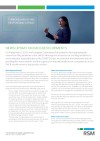On Friday May 8, 2020, the European Commission has shared its formal proposal to extend the filing deadlines under DAC6. Although the extension of the filing deadlines is most welcome, especially due to the COVID19 crisis, we note that the extensions are not providing for much comfort and the urgency for internationally active companies to act on DAC6 should remain a high priority matter.
What happened today?
As mentioned, the European Commission has formally proposed the deferral of certain deadlines under DAC6. An unanimous agreement among EU member states is required to approve the proposal but it seems likely that such approval will happen quickly as EU member states representatives are expected to discuss the proposal early this week.
Once the proposal gets approved, the implementation of proposed measures shall have the following implications:
- The so-called “historical reference period” (running from June 25, 2018 up to and including June 30, 2020) shall remain the same. This means that where a so-called reportable cross-border arrangement is made available for implementation, or is ready for implementation, or where the first step in its implementation has been made between June 25, 2018-June 30, 2020, this arrangement must be reported no later than November 30, 2020.
- A “new” reference period has been introduced due to the changes which shall start as of July 1, 2020 and shall end on September 30, 2020. For the new reference period, the reporting deadline now ends at the latest of October 31, 2020 (starting October 1, 2020).
- The last major change relates to the actual start of exchanging of the filed information between EU member states, which will now start as of February 1, 2021.
What does this mean for you?
Of course, all of these changes mean more time to prepare for the consequences of DAC6. It is not expected that there shall be further guidance provided in the upcoming period to explain some of the unclear definitions and consequences. For now, this extension does result into more time for internationally active companies to get prepared for DAC6, which also includes the process of determining whether or not DAC6 is applicable or not. Regardless of the applicability of DAC6, it is recommended that this process is also used to document why an arrangement is deemed non-reportable.
In essence, the preparation time for arrangements that took place during the historical reference period is now extended from 2 to 5 months.
Although there is a later reporting deadline for the new reference period (that starts July 1, 2020), companies must pay attention to fully utilize that extra time as the deadline may seem later (at the latest October 31, 2020) but the new reference period also covers a longer period (3 months instead of 1 month). That is a short period to cover 3 months.
What are the next steps?
So far, we have noticed that a lot of internationally active companies are underestimating the width of DAC6. Certainly, aggressive tax structuring is part of the DAC6 scope.
However, what is considered aggressive is subjective and certainly has changed in the last 3 years. Therefore, we feel that it is important to analyse whether or not DAC6 should be applicable, especially in relation to the so-called historical reference period. Also, it is important to document why an arrangement is deemed reportable or non-reportable.
Although the extension should be considered as a welcome sign of relief, it should not be mistaken as a sign from the EU that DAC6 will be deferred for a longer period of time. Only in the case where COVID19 will create even more problems, one last extension of 3 months is possible.
To illustrate the importance of DAC6 to the European Commission, we refer to the comments made by the European Commission where it was stated that reportable cross- border arrangements under DAC6 are considered crucial in the fight against tax avoidance and tax evasion in the European Union. Although it does not come as a complete surprise, it was stated that Member States will need tax revenues to finance their considerable efforts to contain the negative economic impact of the measures against the COVID19 pandemic. Therefore, ensuring tax fairness by preventing tax avoidance and tax evasion becomes more important than ever. While the current crisis calls for adjusting the calendar for filing and transmitting tax data, it should not lead to relinquishing the efforts of national administrations for ensuring fair taxation.
As we expected, the European Commission will continue to focus heavily on tax transparency but also refers to COVID19 as a reason to implement DAC6. For now, there is extra time created to prepare for the compliance requirements under DAC6, however, it is not much and unfortunately the extensions are likely not used to create some much needed guidance. Therefore, we recommend strongly to internationally active companies, whenever possible, placing DAC6 high on the tax agenda and at least determine in more detail the possible impact.
More information?
Please contact your trusted RSM advisor to further discuss which measures may be relevant for you and your business.
Download 'News Update on DAC6 Developments' in pdf.

